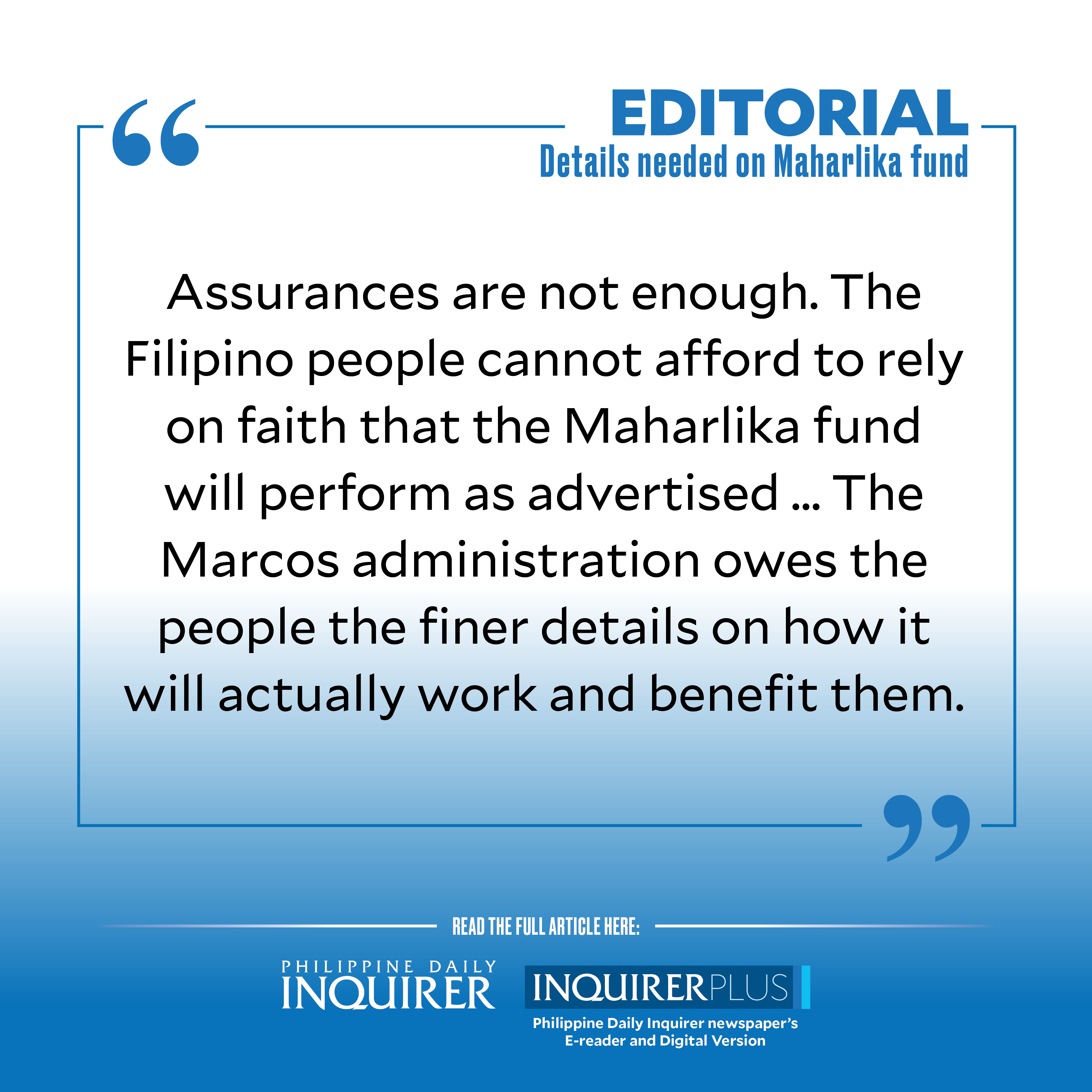Details needed on Maharlika fund
One of the keenly awaited issues during President Marcos’ second State of the Nation Address (Sona) was the contentious Maharlika Investment Fund, and he did talk about it in general terms. “The Maharlika fund shall be used to make high-impact and profitable investments, such as the ‘Build Better More’ program. The gains from the fund shall be reinvested into the country’s economic well-being,” said Mr. Marcos, touting the P8.3-trillion flagship infrastructure program covering physical connectivity, agriculture, health, and clean energy.
Mr. Marcos did try to assuage concerns about governance of the fund by saying that “a group of internally recognized economic managers” will oversee it “to ensure sound financial management” and decisions based “on financial considerations alone, absent any political influence.” He added that funds for social security and public health insurance “shall remain intact and separate.”
Article continues after this advertisementDespite the reassurance, several legislators have raised the possibility of challenging its legality before the Supreme Court.
Former finance undersecretary Romeo Bernardo had criticized the “seeming haste to act on ideas that have not benefited from complete staff work, as in the case of the Maharlika fund.”
Indeed, the Maharlika Investment Fund Act of 2023 was up for the President signature just a little over eight months since it was proposed in Congress on Nov. 8, 2022, and was enacted into law just days before his Sona last July 24. The President’s economic managers and allies in Congress went ahead with the speedy approval of the law despite concerns earlier raised by other legislators as well as professors and lecturers of the University of the Philippines’ School of Economics, who described it as “defective” and posing a serious threat to the country’s economy.
Article continues after this advertisementThe Maharlika Investment Fund has also become a lightning rod for criticisms against the Marcos administration itself. Gabriela Women’s Party condemned it as a “scam” that could worsen corruption in the country, while the militant Bagong Alyansang Makabayan party list slammed the President for rushing the bill instead of first addressing more vital issues such as the wage hike for laborers, pervasive hunger from the rising inflation rate, and challenges to the country’s sovereignty.
Given these grounded fears, it would do well for the Marcos administration to be transparent about the nitty-gritty of the fund’s creation. Bernardo’s advice about prioritizing a “detailed mapping out” of the Maharlika Investment Fund and the Maharlika Investment Corp. (MIC) that will oversee it, to make sure that “it will not be a source of unmanageable fiscal risks down the road’’ is worth considering.
Priority number one, Bernardo added in his policy brief, is finding “credible highly regarded fund managers, CEO, and board directors.” Also on the to-do list is “to find an institution builder that will define the rules, risk management principles, investment guidelines, and other governance guardrails … shorn of agendas and biases,” said Bernardo, who is country analyst for New York-based think tank GlobalSource Partners.
Former finance secretary Gary Teves also stressed that the success of the country’s maiden sovereign wealth fund depends greatly on the people who will manage it to ensure maximum returns at the lowest risk to the people’s money. “It should be a good combination between international and local fund managers,” said Teves, adding that the board members should be trusted, transparent, and credible individuals with no political affiliations.
As it stands now, the MIC has nine board seats reserved for the finance secretary as ex-officio chair, the presidents of Land Bank of the Philippines and the Development Bank of the Philippines, two regular directors, a CEO, and three independent directors. Predictably, Sen. Mark Villar, principal author of the bill in the Senate, expressed confidence that the “best and the brightest” would be placed at the MIC to dispel doubts that its initial capital of P125 billion would be squandered. Speaking for other supporters, Villar said they have “faith” in the President who have “precisely guaranteed to us” that the head of Maharlika would be “someone whose integrity is beyond doubt, [and whose] capability is also well respected.”
But assurances are not enough. The Filipino people cannot afford to rely on faith that the Maharlika fund will perform as advertised. Vigilance should be exercised every step of the way—from the formulation of the implementing rules and regulations of the fund, which are expected to be done by the end of August, to the filling up of the board by September, and its becoming fully operational early next year. The Marcos administration owes the people the finer details on how it will actually work and benefit them.

















